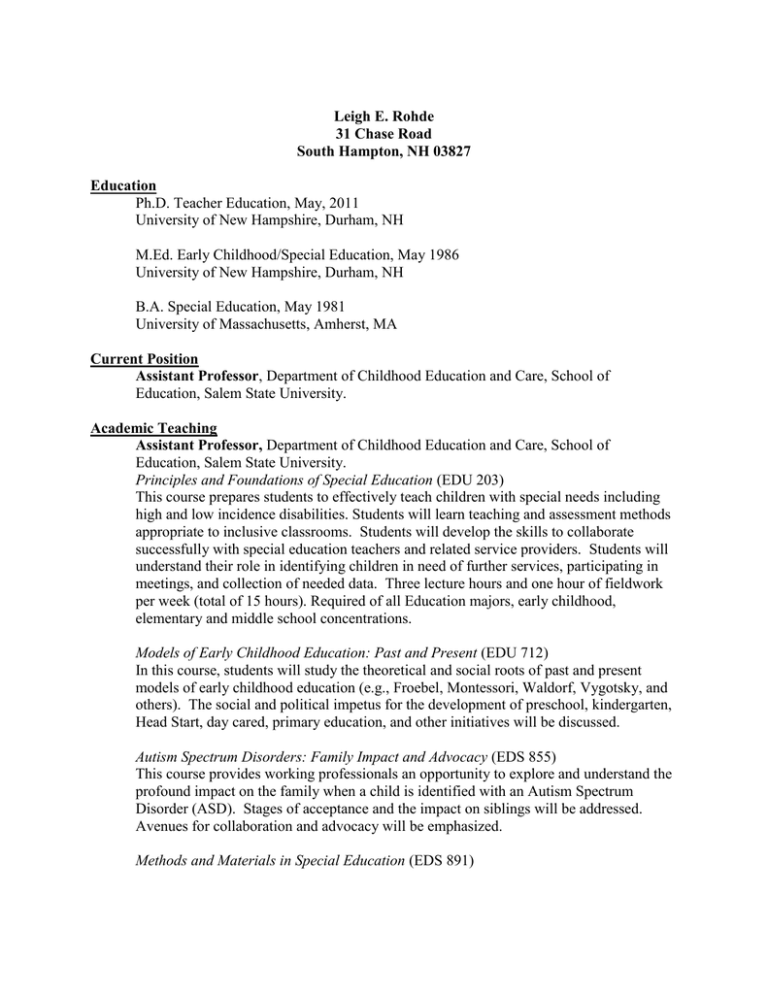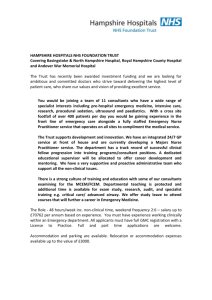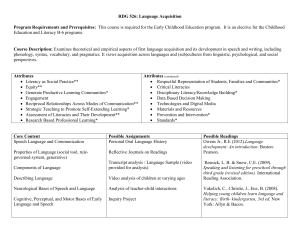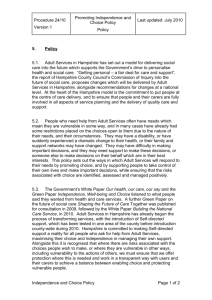resume - Salem State University
advertisement

Leigh E. Rohde 31 Chase Road South Hampton, NH 03827 Education Ph.D. Teacher Education, May, 2011 University of New Hampshire, Durham, NH M.Ed. Early Childhood/Special Education, May 1986 University of New Hampshire, Durham, NH B.A. Special Education, May 1981 University of Massachusetts, Amherst, MA Current Position Assistant Professor, Department of Childhood Education and Care, School of Education, Salem State University. Academic Teaching Assistant Professor, Department of Childhood Education and Care, School of Education, Salem State University. Principles and Foundations of Special Education (EDU 203) This course prepares students to effectively teach children with special needs including high and low incidence disabilities. Students will learn teaching and assessment methods appropriate to inclusive classrooms. Students will develop the skills to collaborate successfully with special education teachers and related service providers. Students will understand their role in identifying children in need of further services, participating in meetings, and collection of needed data. Three lecture hours and one hour of fieldwork per week (total of 15 hours). Required of all Education majors, early childhood, elementary and middle school concentrations. Models of Early Childhood Education: Past and Present (EDU 712) In this course, students will study the theoretical and social roots of past and present models of early childhood education (e.g., Froebel, Montessori, Waldorf, Vygotsky, and others). The social and political impetus for the development of preschool, kindergarten, Head Start, day cared, primary education, and other initiatives will be discussed. Autism Spectrum Disorders: Family Impact and Advocacy (EDS 855) This course provides working professionals an opportunity to explore and understand the profound impact on the family when a child is identified with an Autism Spectrum Disorder (ASD). Stages of acceptance and the impact on siblings will be addressed. Avenues for collaboration and advocacy will be emphasized. Methods and Materials in Special Education (EDS 891) Students who participate in this course will learn about the administrative and instructional responsibilities of the special education teacher including the pre-referral process, the team meeting, writing and implementing an IEP, designing and implementing instruction, and assessing instruction for its fitness for specific students and its impact on student learning. The course is designed for teachers of students with mild to moderate disabilities. Prerequisites: AGS/EDS739 and EDG790 Practicum/Internship Moderate Special Needs (EDS 959P) This course is designed to validate competencies for provisional certification in special education (moderate special needs) and is required for all professional educators seeking such certification in special education who do not hold any state certification. Adjunct Professor, Early Childhood Education Program, University of New Hampshire, Durham, NH Socio-Cultural Perspectives on Teaching and Learning (EDUC 942) This course is offered to master’s degree students in Early Childhood Education and Early Childhood Special Education. It considers the growing body of knowledge on the role of play in children's development; includes examination of contemporary constructive theory. A 25 hour field placement in an Early Intervention or Early Head Start program is a vital part of the class. Assignments include research review and student-designed study of child development issue related to diversity. Inclusive Curriculum for Young Children with Disabilities (EDUC 944). This course is for master’s degree students and assumes a solid understanding of child development from birth through age eight. It builds upon principles of teaching and learning as explained by understanding a constructivist theoretical interpretation of the relationship between individuals and the larger socio-cultural context. A major premise of this course is the view of the early childhood professional as a contributor to the a) negotiation of educational goals, b) the articulation of effective and ethical pedagogical theory, and c) advocacy on behalf of all young children and their families to an early childhood education that serves them well within the context of a pluralistic society. Embedded within this premise is the value assigned to inclusive educational environments and curricula that interpret diversity as an asset rather than a liability. Introduction to Young Children with Special Needs (EDUC 760/860). The developmental characteristics and socio-cultural environment of children from birth to eight years who have disabilities, developmentally delays, or are at-risk for disabling conditions will be examined. The course presents basic information on the physiological, social, and psychological causes and consequences of disabling conditions in young children. Major themes considered include the early identification of disabilities and delays, the roles of multidisciplinary professionals, the concerns of family members, the role of community in child development, the design of model early intervention programs, and current research in the field of early childhood special education. Internship & Seminar in Early Childhood Education (EDUC 900/901B). Led weekly seminar for students focusing on the skills and knowledge needed to be successful in their internship experience. Supervised and supported students in their internship sites. Adjunct Professor, College of Health and Human Services, University of New Hampshire, Durham, NH The Right to be Disabled in an Extreme Makeover Society (HHS 444). This course explores how society’s view of disability is influenced by a variety of cultural variables and the implications of that construction on institutions such as medicine and health care, education, the arts, the legal system, architecture and engineering, for example. Students explore alternate paradigms that consider disability as a natural part of human diversity. Adjunct Professor, Child Development Program, Southern New Hampshire University, Manchester, NH Play (DEV 565) This course, for graduate degree students, examines the history, importance, and components of play in early childhood education settings. Students learn through handson activities, class discussions, and on-line reflections to explore the purpose and function of play throughout all of the developmental domains. Adjunct Professor, Early Childhood Education Program, New Hampshire Technical Institute, Concord, NH Early Intervention Practicum (EC 278). This course provides a hands-on learning experience for students by placing them in Early Supports and Services programs for a practicum experience. In addition, students participate in a seminar focusing on various aspects of working with very young children with disabilities and their families. Using Children’s Literature to Support Young Children’s Language and Literacy Development (EC 155).The course uses high quality children's books as a vehicle for supporting and applying current research on the acquisition of language and reading from birth to age 8 and the teacher's role in promoting family literacy and participate in service learning on this topic. Taught both as traditional course and on-line. Applied Teaching Family Support Coordinator, Richie McFarland Children's Center, Stratham, NH Led family support meetings for parents of young children with disabilities. Wrote monthly newsletter, circulation of 150 subscribers. Organized parent-to-parent support system for new families in early intervention. Scheduled workshops (e.g., special education, discipline, technology) for parents. Special Education Preschool Teacher Project TELL, Pembroke, NH Responsible for caseload of up to 20 preschoolers with special educational needs, wrote and maintained IEPs, conducted evaluations. Organized and led classroom activities. Supervised classroom and child-specific aides and collaborated with related service providers (OT, PT, S/LP, Vision specialist) within the classroom. Research Experience Co-Investigator: Your Voice Matters. University of New Hampshire, Department of Education and the Institute on Disability. Department of Health and Human Services, State of New Hampshire. Designed, conducted, and analyzed survey data of early care and education providers throughout the state to determine professional development needs. Principal Investigator: Department of Education, University of New Hampshire. Emergent Literacy is a growing practice in Early Childhood Education Settings. The use of common and recommended emergent literacy practices are examined by means of teacher report using a mixed-method survey design. Resulted in Dissertation, “Emergent Literacy and Disability: Preschool Teachers' Beliefs and Practices” and additional papers. Co-Investigator: NH RESPONDS. New Hampshire Department of Education, Institute on Disability, University of New Hampshire. Secured funding through RFP process. Examined the effects of Response-to-Intervention in Early Childhood Education settings (Inclusive and self-contained special education settings). Child assessment of emergent literacy, data collection and analysis, professional development of ECE providers. Principal Investigator: Granite Ladders: The Portsmouth Project. Institute on Disability, University of New Hampshire. Examined use of professional development on the emergent literacy classroom practices of early childhood educators. Resulted in presentation “Creating High-Quality Emergent Literacy Opportunities in Preschool: Professional Development and Reflective Practice at Work” at International Reading Association Annual Conference. Research Assistant: Granite Ladders: An Experimental Evaluation of an Early Literacy Curriculum for New Hampshire’s Preschoolers. Institute on Disability, University of New Hampshire. US Department of Education, Institute of Education Sciences, Preschool Curriculum Evaluation Research project. Examined the use of a published preschool emergent literacy curriculum in Head Start classrooms. Resulted in poster presentation at Council for Exceptional Children, Division of Early Childhood conference. Research Assistant: Community Options Project, Institute on Disability/UAP, University of New Hampshire. Coordination of all aspects of the project. Developed workshop, including all materials, entitled “Educating Young Children About Diversity and Disabilities” for parents, teachers and child care providers. Co-wrote articles and other materials around the inclusion of young children with disabilities in typical settings. Produced video “The Magic of Belonging” demonstrating inclusive preschool practices Certifications New Hampshire Department of Health and Human Services, Child Development Bureau: Workshop Trainer, Faculty, Individual Mentor, Program Consultant On-Line Instructor – University of New Hampshire (Completed training certification program) Publications Rohde, L. (pending) The Comprehensive Emergent Literacy Model: Early literacy in context Submitted to SAGE Online. March 3, 2014 Steel, E., Pomerleau, T., Muscott, H., & Rohde, L. (2013) Program-wide Positive Behavioral Interventions and Supports in Rural Preschools, Rural Special Education Quarterly, 32 (1). Cho, E. K., & Rohde, L. (2012) Professional Development Needs of Early Supports and Services Providers in New Hampshire. University of New Hampshire. Rohde, Leigh. (2011). Preschool Teachers' Beliefs and Practices: Emergent Literacy in Inclusive Preschools. University of New Hampshire. Rohde, L. & Pomerleau, T. (2010). Response to intervention preschool team checklist 3.0, Tier 1: Primary prevention system self-assessment and action planning tool. Durham, NH: Institute on Disability, University of New Hampshire; Bedford, NH: New Hampshire Center on Positive Behavioral Interventions and Supports and Southern Regional Education Service Center. Nelson, D., Zoellick, L., & Dillon, A. (2000). Catching the Wind, Changing the Rules: Enhancing community options for families of young children. In J. Nisbet & D. Hagner (Eds.), Part of the community: Strategies for including everyone. Baltimore: Paul H. Brookes. Nelson, D., Zoellick, L. & Tracy, N. (1999) The Magic of Belonging (Videotape) Institute on Disability/UAP, University of New Hampshire. Research Presentations Using Systematic Observation in Head Start to Evaluate Classroom Ecology and Develop Interventions Head Start National Research Conference Granite Ladders: An Experimental Evaluation of an Early Literacy Curriculum for New Hampshire’s Preschoolers Preschool Curriculum Evaluation Research Conference Council for Exceptional Children, Division of Early Childhood Creating High-Quality Emergent Literacy Opportunities in Preschool: Professional Development and Reflective Practice at Work International Reading Association Selected Professional Presentations Inclusion of Young Children with Disabilities, ChildFund International, Minsk, Belarus, April, 2012 Early Language and Literacy Development: A Webinar Series in Early Childhood Education (1. Building Language: Developing Young Children’s Vocabulary; 2. Building Literacy Skills: Exploring Letters, Sounds, and Words; 3. Building Literacy Knowledge: Using Storybooks and Journaling to Develop Understanding about Reading, Writing, and Communication), Institute on Disability, University of New Hampshire, May 2012 Literacy for Children with Language Delays, Child Care Resource and Referral for New Hampshire, Dec 2011 Intentional Teaching: Planning with a Purpose, Early Education and Intervention Network, Dec 2011 Emergent Literacy Learning in ECE: Creating Environments, Creating Results, Institute on Disability Professional Development Series, Winter, 2010. Emergent Literacy in Head Start Classrooms RCA Head Start Program, May 2009 Literacy and Students with Autism Spectrum Disorders ASD Mini-series, Institute on Disability, University of New Hampshire, April 2009 Professional Activities/Service PDP Provider: Educator Workshop on Tourette Syndrome and coexisting conditions Tourette Syndrome Association of Massachusetts. December, 2013. Developed and implemented program for Professional Development Points for Massachusetts licensed educators. School Counseling Faculty Search Committee, School of Education, SSU – Member Special Education Faculty Search Committee, School of Education, SSU – Member Master’s Students Oral Comprehensive Exam Committee –University of New Hampshire Master’s Student Thesis Committee –University of New Hampshire Social Justice Educator, University of New Hampshire SPARK-NH – Workforce and Professional Development Committee – Member Professional Affiliations National Association for the Education of Young Children, Member Council for Exceptional Children, Division of Early Childhood, Member International Reading Association, Member Northern New England Down Syndrome Congress -Board of Directors, 2003 - 2004 New Hampshire Child Care Advisory Committee - Governor appointee 1994 - 2000 Early Intervention Network of New Hampshire Board of Directors, 1992 - 1995




